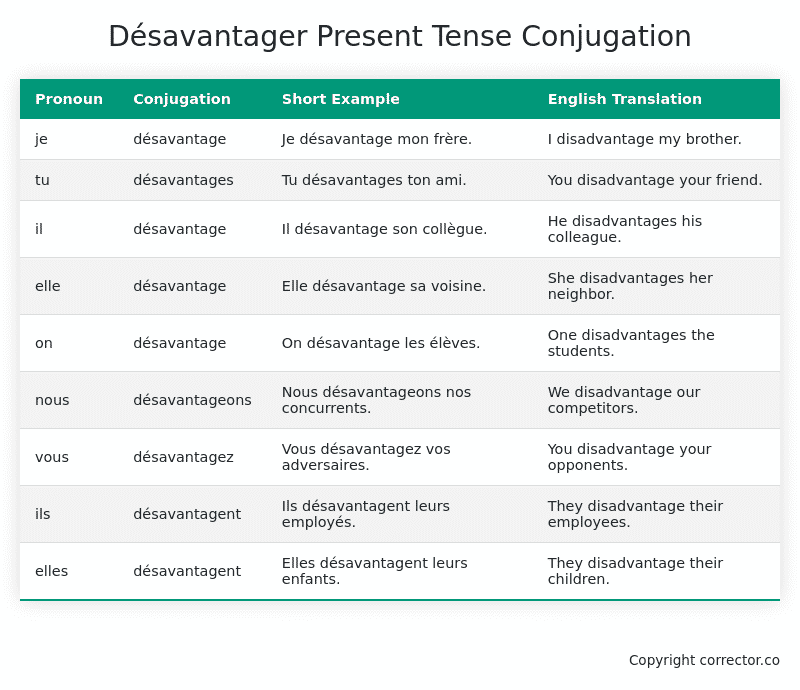Le Present (Present Tense) Conjugation of the French Verb désavantager
Introduction to the verb désavantager
The English translation of the French verb désavantager is “to disadvantage.” The infinitive form of désavantager is pronounced as “day-zah-vahn-tah-zhay.”
The term désavantager originates from the combination of the prefix “dés-” (meaning “un-” or “dis-“) and the verb “avantager” (meaning “to advantage” or “to benefit”). It is most often used in everyday French to express the action of putting someone at a disadvantage or causing a disadvantageous situation.
Examples:
- Ils ne veulent pas désavantager les enfants en augmentant les frais scolaires. (They don’t want to disadvantage the children by increasing school fees.)
- Les nouvelles politiques risquent de désavantager les petites entreprises. (The new policies may disadvantage small businesses.)
- Le système actuel désavantage les personnes handicapées. (The current system disadvantages people with disabilities.)
Désavantager – About the French Present Tense
To take a deep dive into all the French tenses then see our article on Mastering French Tense Conjugation.
Common Everyday Usage Patterns For Le Present
Interactions with Other Tenses
Table of the Present Tense Conjugation of désavantager
| Pronoun | Conjugation | Short Example | English Translation |
|---|---|---|---|
| je | désavantage | Je désavantage mon frère. | I disadvantage my brother. |
| tu | désavantages | Tu désavantages ton ami. | You disadvantage your friend. |
| il | désavantage | Il désavantage son collègue. | He disadvantages his colleague. |
| elle | désavantage | Elle désavantage sa voisine. | She disadvantages her neighbor. |
| on | désavantage | On désavantage les élèves. | One disadvantages the students. |
| nous | désavantageons | Nous désavantageons nos concurrents. | We disadvantage our competitors. |
| vous | désavantagez | Vous désavantagez vos adversaires. | You disadvantage your opponents. |
| ils | désavantagent | Ils désavantagent leurs employés. | They disadvantage their employees. |
| elles | désavantagent | Elles désavantagent leurs enfants. | They disadvantage their children. |
Other Conjugations for Désavantager.
Le Present (Present Tense) Conjugation of the French Verb désavantager (You’re reading it right now!)
Imparfait (Imperfect) Tense Conjugation of the French Verb désavantager
Passé Simple (Simple Past) Tense Conjugation of the French Verb désavantager
Passé Composé (Present Perfect) Tense Conjugation of the French Verb désavantager
Futur Simple (Simple Future) Tense Conjugation of the French Verb désavantager
Futur Proche (Near Future) Tense Conjugation of the French Verb désavantager
Plus-que-parfait (Pluperfect) Tense Conjugation of the French Verb désavantager
Passé Antérieur (Past Anterior) Tense Conjugation of the French Verb désavantager
Futur Antérieur (Future Anterior) Tense Conjugation of the French Verb désavantager
Subjonctif Présent (Subjunctive Present) Tense Conjugation of the French Verb désavantager
Subjonctif Passé (Subjunctive Past) Tense Conjugation of the French Verb désavantager
Subjonctif Imparfait (Subjunctive Imperfect) Tense Conjugation of the French Verb désavantager
Conditionnel Présent (Conditional Present) Tense Conjugation of the French Verb désavantager
Conditionnel Passé (Conditional Past) Tense Conjugation of the French Verb désavantager
Conditionnel Passé II (Conditional Past II) Tense Conjugation of the French Verb désavantager
L’impératif Présent (Imperative Present) Tense Conjugation of the French Verb désavantager
L’impératif Passé (Imperative Past) Tense Conjugation of the French Verb désavantager
L’infinitif Présent (Infinitive Present) Tense Conjugation of the French Verb désavantager
L’infinitif Passé (Infinitive Past) Tense Conjugation of the French Verb désavantager
Le Participe Présent (Present Participle) Tense Conjugation of the French Verb désavantager
Le Participe Passé (Past Participle) Tense Conjugation of the French Verb désavantager
Struggling with French verbs or the language in general? Why not use our free French Grammar Checker – no registration required!
Get a FREE Download Study Sheet of this Conjugation 🔥
Simply right click the image below, click “save image” and get your free reference for the désavantager present tense conjugation!

I hope you enjoyed this article on the verb désavantager. Still in a learning mood? Check out another TOTALLY random French verb present conjugation!


